How have you used data analysis to drive quality improvements in your previous role?
Manufacturing Quality Specialist Interview Questions
Sample answer to the question
In my previous role, I used data analysis to drive quality improvements by closely monitoring the manufacturing processes and conducting regular quality inspections. I would collect data on the defects and issues identified during these inspections and analyze them to identify trends and problem areas. This analysis helped me to pinpoint the root causes of quality issues and develop effective solutions. For example, I noticed a recurring issue with a specific component of the product, and through data analysis, I discovered that it was due to a flaw in the manufacturing process. I then worked with the production team to implement a corrective action plan, which significantly reduced the number of defects. Overall, data analysis played a crucial role in driving quality improvements and ensuring that our products met the established standards of quality.
A more solid answer
In my previous role as a Manufacturing Quality Specialist, I utilized data analysis extensively to drive quality improvements. One of the key ways I did this was by closely monitoring the manufacturing processes and conducting regular quality inspections. During these inspections, I would collect data on defects and issues and analyze them using statistical quality control techniques. This allowed me to identify trends and problem areas. A particular instance where data analysis proved invaluable was when I noticed a recurring issue with a specific component of the product. Through data analysis, I discovered that it was due to a flaw in the manufacturing process. I then worked with the production team to implement a corrective action plan, addressing the root cause of the issue. This resulted in a significant reduction in defects and increased overall product quality. Additionally, I used data analysis to track the effectiveness of quality improvement initiatives, ensuring that they were successfully implemented and maintained over time. By leveraging my analytical skills and knowledge of statistical quality control, I was able to drive continuous improvement in quality and meet the established standards of reliability, usability, and performance.
Why this is a more solid answer:
The solid answer provides more details about the specific techniques and tools used for data analysis and how the candidate tracked the effectiveness of quality improvement initiatives. It also emphasizes the candidate's analytical skills and knowledge of statistical quality control. However, it could be improved by providing more quantifiable outcomes and results of the quality improvements.
An exceptional answer
In my previous role as a Manufacturing Quality Specialist, I utilized data analysis to drive quality improvements throughout the entire production process. I implemented a comprehensive data collection system, utilizing advanced statistical analysis tools like Six Sigma and Pareto charts to identify key quality drivers. By consistently collecting and analyzing data, I was able to identify patterns and trends in quality issues, allowing me to proactively address them. For example, I noticed a significant increase in defects related to a specific production line. By conducting a deep-dive analysis, I discovered that a particular machine was causing the defects. I collaborated with the engineering team to implement modifications to the machine, resulting in a 50% reduction in defects. In addition, I used data analysis to create a predictive quality model that helped in identifying and solving quality issues before they occurred. This proactive approach reduced defects by 30% and improved overall product reliability. Furthermore, I regularly presented data-driven reports to the management team, highlighting the impact of quality improvement initiatives and making recommendations for continuous enhancement. By leveraging my analytical skills, knowledge of statistical quality control, and proficiency with analytical tools, I was able to drive significant quality improvements and ensure that all products met the established standards of quality.
Why this is an exceptional answer:
The exceptional answer not only provides specific techniques and tools used for data analysis but also demonstrates the candidate's ability to implement a comprehensive data collection system and create a predictive quality model. It also highlights quantifiable outcomes of the quality improvements, such as a 50% reduction in defects and a 30% improvement in product reliability. Additionally, the candidate showcases their ability to present data-driven reports and make recommendations for continuous enhancement. This answer goes above and beyond in demonstrating the candidate's expertise in driving quality improvements using data analysis.
How to prepare for this question
- Brush up on statistical quality control methods and tools such as Six Sigma, Pareto charts, and regression analysis.
- Familiarize yourself with different data analysis techniques like trend analysis, root cause analysis, and predictive modeling.
- Prepare specific examples from your previous role where you used data analysis to drive quality improvements.
- Practice explaining how you tracked the effectiveness of quality improvement initiatives and presented data-driven reports to stakeholders.
- Highlight your attention to detail and problem-solving abilities during the interview.
What interviewers are evaluating
- Analytical skills
- Problem-solving abilities
- Knowledge of statistical quality control
Related Interview Questions
More questions for Manufacturing Quality Specialist interviews